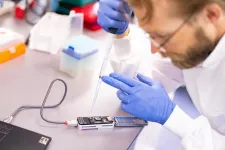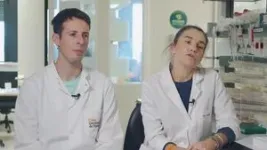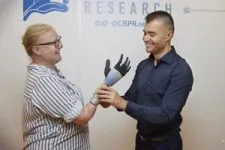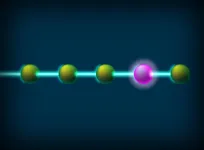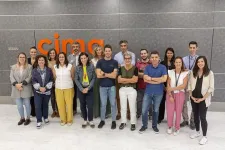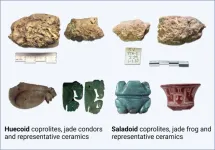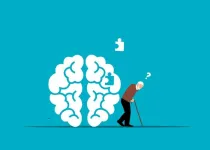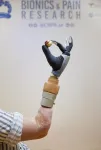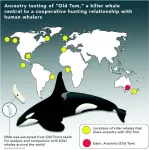(Press-News.org) What type of brain tumor does this patient have? AI technology helps to determine this as early as during surgery, within 1.5 hours. This process normally takes a week. The new technology allows neurosurgeons to adjust their surgical strategies on the spot. Today, researchers from UMC Utrecht and researchers, pathologists and neurosurgeons from the Princess Máxima Center for pediatric oncology and Amsterdam UMC have published about this study in Nature.
Every year, 1,400 adults and 150 children are diagnosed with a tumor in the brain or spinal cord in the Netherlands. Surgery is often the first step taken in treatment. Currently, during surgery, neurosurgeons do not precisely know what type of brain tumor and what degree of aggressiveness they are dealing with. The exact diagnosis will usually only be available one week after surgery, after the tumor tissue has been visually and molecularly analyzed by the pathologist.
Deep-learning algorithm
Researchers from UMC Utrecht have developed a new ‘deep-learning algorithm’, a form of artificial intelligence, which significantly speeds up diagnosis.
Jeroen de Ridder, research group leader within UMC Utrecht and Oncode Institute: “Recently, Nanopore sequencing became available: a technology that helps to read DNA in real time. For this, we developed an algorithm that is equipped to learn from millions of simulated realistic ‘DNA snapshots’. With this algorithm, we can identify the tumor type within 20 to 40 minutes. And that is fast enough to directly adjust the surgical strategy, if necessary.”
Tested and trained with biobank
Bastiaan Tops is in charge of the Pediatric Oncology Laboratory at the Princess Máxima Center. He brought together the new technology and the needs from the operating room. This was made possible by funding from the KiKa foundation and, more specifically, to the extensive biobank that the Máxima Center has maintained for years. Among other things, this biobank stores tissue from children with brain tumors. The algorithm was trained and tested using the biobank.
“That we can now determine the type of brain tumor as soon as during surgery shows how technology can speed up diagnostics. And how we can use an existing biobank to develop new technology”, Tops says.
Used during surgery
Consequently, the whole procedure was also carried out several times during actual brain surgeries, from taking the tissue in the operating room to determining the tumor type. In Utrecht, this happened with children, and in Amsterdam with adults. Total length of the procedure: 60 to 90 minutes.
The Princess Máxima Center has decided that the results of the technique are sufficiently reliable and is already using it with children for whom the outcome may determine the surgical strategy. Amsterdam UMC will also use the technique in daily practice, to help them speed up diagnosis.
Eelco Hoving, pediatric neurosurgeon and clinical director of neuro-oncology at the Máxima Center, is excited about the possibilities of DNA analysis during surgery: “During surgery, a small remnant of tumor tissue is sometimes deliberately left behind to prevent neurological damage. But if it will later turn out, for example, that the tumor is very aggressive, a second surgery may still be necessary to remove that last remnant. This will again create risks and stress for patients and their families. This can be avoided now because we will already know during the first surgery what type of tumor we are dealing with."
Jeroen de Ridder: “It is wonderful that we have been able to actually make the step into clinical practice by combining all areas of expertise, from basic researchers to pathologists and surgeons. By doing so, we can help surgeons to optimize the outcome of brain tumor surgery.”
Comparative research
To use the new technique even more widely and structurally, more research is needed. For instance, more tumor types should be added to the algorithm. In this way, international standards will be met, allowing comparison of data. Also, the outcomes of the new and current (lengthier) method will be further compared, in collaboration with other (inter)national centers. This should make clear whether the new method will also contribute to patients' quality of life in the long term.
Learn more about this research (including videos) in this article on the UMC Utrecht website.
Artificial intelligence is part of UMC Utrecht's strategy, working towards the healthcare of tomorrow (‘de zorg van morgen’). All Health AI initiatives have been assembled, in order to promote wider and faster AI implementation in healthcare, education and research. UMC Utrecht and Utrecht University house five Health AI Labs. Jeroen de Ridder is one of the directors of the AI Lab for Molecular Medicine.
END
AI speeds up identification brain tumor type
Brain tumor type identified as soon as during surgery
2023-10-11
ELSE PRESS RELEASES FROM THIS DATE:
A new way to erase quantum computer errors
2023-10-11
Quantum computers of the future hold promise in solving all sorts of problems. For example, they could lead to more sustainable materials, new medicines, and even crack the hardest problems in fundamental physics. But compared to classical computers in use today, rudimentary quantum computers are more prone to errors. Wouldn't it be nice if researchers could just take out a special quantum eraser and get rid of the mistakes?
Reporting in the journal Nature, a group of researchers led by Caltech is among the first to demonstrate a type of quantum eraser. The physicists show that they can pinpoint and correct for mistakes in quantum computing ...
Blocking an immune molecule reduces tumor growth and prolongs survival in animal models of the most aggressive childhood cancer
2023-10-11
Researchers from Cima and the Clínica Universidad de Navarra, together with the international cooperative group Diffuse Midline Glioma (DMG-ACT), have confirmed that blocking an immune checkpoint molecule reduces the tumor and prolongs survival in animal models of the most aggressive childhood cancer. This research, carried out at the Cancer Center Clínica Universidad de Navarra, shows that inhibition of TIM-3 promotes the immune memory of diffuse intrinsic stem glioma (DIPG) and improves the prognosis of the disease.
DIPG is an aggressive brain stem tumor and the leading cause of death related to pediatric cancer. Due to its location therapeutic ...
Mummified poop reveals pre-Columbian cultures of the Caribbean consumed a diversity of plants, with peanuts, papaya, maize, and even cotton and tobacco detected
2023-10-11
DNA analysis of mummified poop reveals two pre-Columbian Caribbean cultures ate a wide variety of plants, like maize, sweet potato, and peanuts—and tobacco and cotton traces were detected too, according to a study published October 11, 2023 in the open-access journal PLOS ONE by Jelissa Reynoso-García from the University of Puerto Rico, Puerto Rico, and colleagues.
Mummified poop, or coprolites, can reveal clues to diet and lifestyle. In this study, Reynoso-García and colleagues analyzed plant DNA isolated from coprolites sampled from archeological sites of two pre-Columbian cultures (Huecoid and Saladoid) to see what these peoples ate ...
Risk factors for dementia vary by ethnicity, study finds
2023-10-11
Modifiable risk factors—including hypertension, obesity, diabetes, low HDL cholesterol and sleep disorders—confer a higher risk of dementia for people in some minority ethnic groups compared to White people, according to a new study published this week in the open-access journal PLOS ONE by Naaheed Mukadam of University College London, UK, and colleagues.
The number of people with dementia is on the rise around the world. There has been increasing interest in potentially modifiable risk factors, ...
Study links selfies to higher ratings of slimness
2023-10-11
In a new study, participants tended to rate women’s bodies as slimmer when viewed in selfie photographs than in photographs taken from other angles. Ruth Knight of York St John University, UK, and Catherine Preston of the University of York, UK, present these findings in the open-access journal PLOS ONE on October 11.
Popular on social media, selfies are portraits taken by the photo’s subject, who positions the camera away from their body but pointed back at themself. Prior research has suggested that viewing selfies might affect viewers’ judgments of the photo subjects’ attractiveness and could, in some cases, lead to ...
Groundbreaking achievement as bionic hand merges with user’s nervous and skeletal systems, remaining functional after years of daily use
2023-10-11
Karin's life took a dramatic turn when a farming accident claimed her right arm over 20 years ago. Since then, she endured excruciating phantom limb pain. “It felt like I constantly had my hand in a meat grinder, which created a high level of stress and I had to take high doses of various painkillers.” In addition to her intractable pain, she found that conventional prostheses were uncomfortable and unreliable, and thus of little help in daily life. All this changed when she received groundbreaking bionic technology that allowed her to wear a much more functional ...
Drug-filled nanocapsule helps make immunotherapy more effective in mice
2023-10-11
UCLA researchers have developed a new treatment method using a tiny nanocapsule to help boost the immune response, making it easier for the immune system to fight and kill solid tumors.
The investigators found the approach, described in the journal Science Translational Medicine, increased the number and activity of immune cells that attack the cancer, making cancer immunotherapies work better.
“Cancer immunotherapy has reshaped the landscape of cancer treatment,” said senior author of the ...
Trial results indicate potential for organ transplantation without long-term immunosuppression
2023-10-11
Giving living donor liver transplant recipients an infusion of immune cells derived from their donor a week before transplantation is feasible, safe – and may lead to recipients being successfully weaned off immunosuppressant medications without rejecting the transplanted organ.
The early-stage clinical trial results by University of Pittsburgh School of Medicine scientists, reported today in Science Translational Medicine, point to a path that may spare organ transplant recipients from the serious side effects of long-term immunosuppressant use, which can include cancer, diabetes, kidney failure and susceptibility to infections.
“These trial results are very encouraging,” ...
Evolutionary secrets of ‘Old Tom’ and the killer whales of Eden revealed by genetic study
2023-10-11
Evolutionary biologists have for the first time decoded the genetic lineage of a famous killer whale and a pod that once worked alongside whale hunters off the coast of New South Wales.
In the Australian tradition of claiming New Zealand’s celebrities as its own, Old Tom, the leader of a pod of killer whales that famously helped whalers hunt baleen whales in the 20th century, has ancestral links to modern-day killer whales in New Zealand, according to new DNA research.
Old Tom also shared a common ancestor with killer whales from Australasia, the North Pacific, and North Atlantic Oceans, but is most similar to modern New Zealand killer whales. However, most of Tom’s ...
Fruit fly serenade: Princeton neuroscientists decode their tiny mating song
2023-10-11
Love songs are at least as popular in the animal kingdom as on the radio. The importance of musically serenading your true love has driven plotlines from Twelfth Night to The Trumpet of the Swan to Happy Feet.
The latest exploration of music in the natural world is taking place in Mala Murthy’s lab at the Princeton Neuroscience Institute, where Murthy and her research group have used neural imaging, optogenetics, motion capture, modeling and artificial intelligence to pinpoint precisely where and how a fruit fly’s brain toggles between its standard solo and its mating serenade. Their research ...
LAST 30 PRESS RELEASES:
ASU researchers showcase scalable tech solutions for older adults living alone with cognitive decline at AAAS 2026
Scientists identify smooth regional trends in fruit fly survival strategies
Antipathy toward snakes? Your parents likely talked you into that at an early age
Sylvester Cancer Tip Sheet for Feb. 2026
Online exposure to medical misinformation concentrated among older adults
Telehealth improves access to genetic services for adult survivors of childhood cancers
Outdated mortality benchmarks risk missing early signs of famine and delay recognizing mass starvation
Newly discovered bacterium converts carbon dioxide into chemicals using electricity
Flipping and reversing mini-proteins could improve disease treatment
Scientists reveal major hidden source of atmospheric nitrogen pollution in fragile lake basin
Biochar emerges as a powerful tool for soil carbon neutrality and climate mitigation
Tiny cell messengers show big promise for safer protein and gene delivery
AMS releases statement regarding the decision to rescind EPA’s 2009 Endangerment Finding
Parents’ alcohol and drug use influences their children’s consumption, research shows
Modular assembly of chiral nitrogen-bridged rings achieved by palladium-catalyzed diastereoselective and enantioselective cascade cyclization reactions
Promoting civic engagement
AMS Science Preview: Hurricane slowdown, school snow days
Deforestation in the Amazon raises the surface temperature by 3 °C during the dry season
Model more accurately maps the impact of frost on corn crops
How did humans develop sharp vision? Lab-grown retinas show likely answer
Sour grapes? Taste, experience of sour foods depends on individual consumer
At AAAS, professor Krystal Tsosie argues the future of science must be Indigenous-led
From the lab to the living room: Decoding Parkinson’s patients movements in the real world
Research advances in porous materials, as highlighted in the 2025 Nobel Prize in Chemistry
Sally C. Morton, executive vice president of ASU Knowledge Enterprise, presents a bold and practical framework for moving research from discovery to real-world impact
Biochemical parameters in patients with diabetic nephropathy versus individuals with diabetes alone, non-diabetic nephropathy, and healthy controls
Muscular strength and mortality in women ages 63 to 99
Adolescent and young adult requests for medication abortion through online telemedicine
Researchers want a better whiff of plant-based proteins
Pioneering a new generation of lithium battery cathode materials
[Press-News.org] AI speeds up identification brain tumor typeBrain tumor type identified as soon as during surgery
